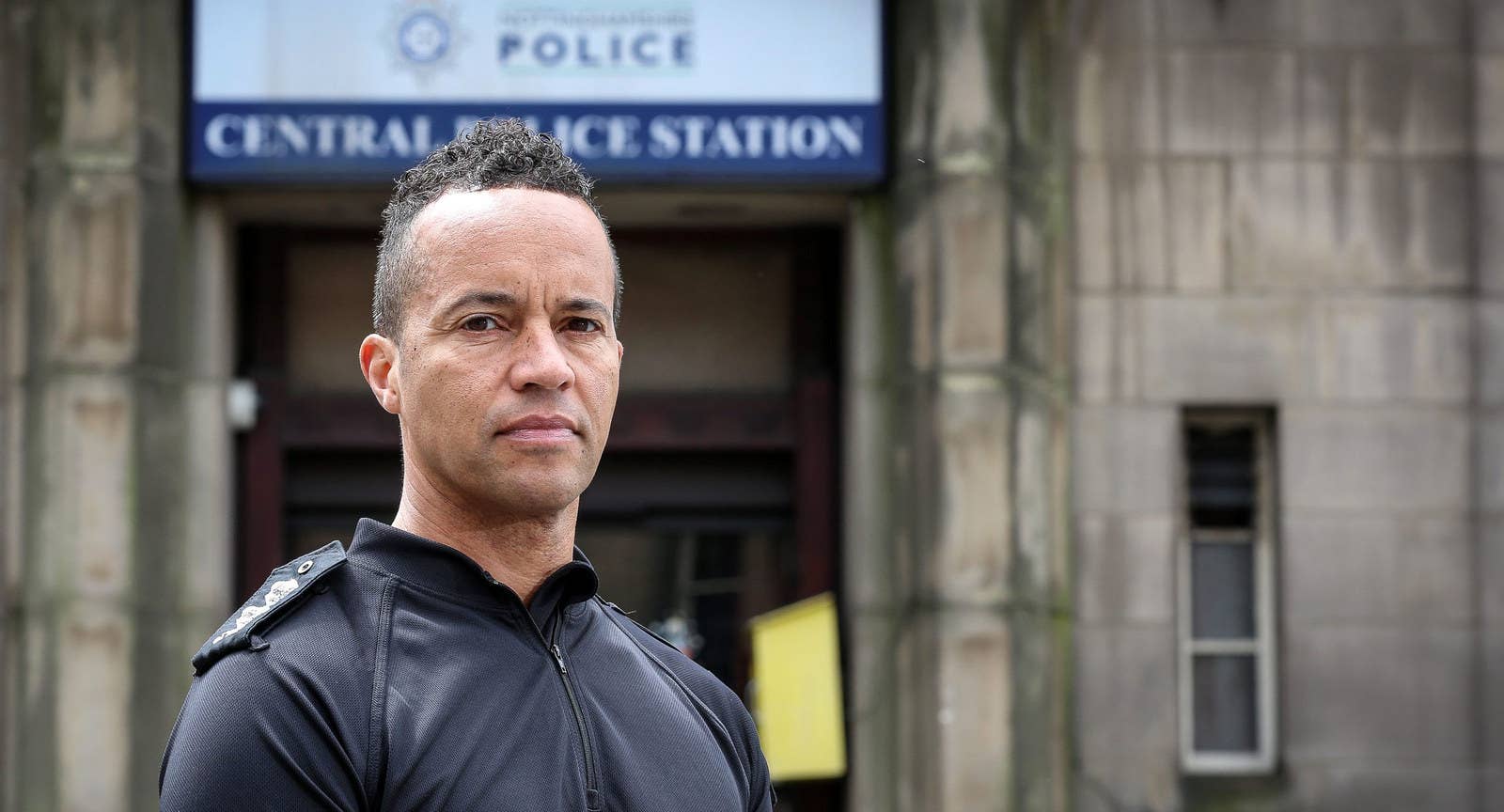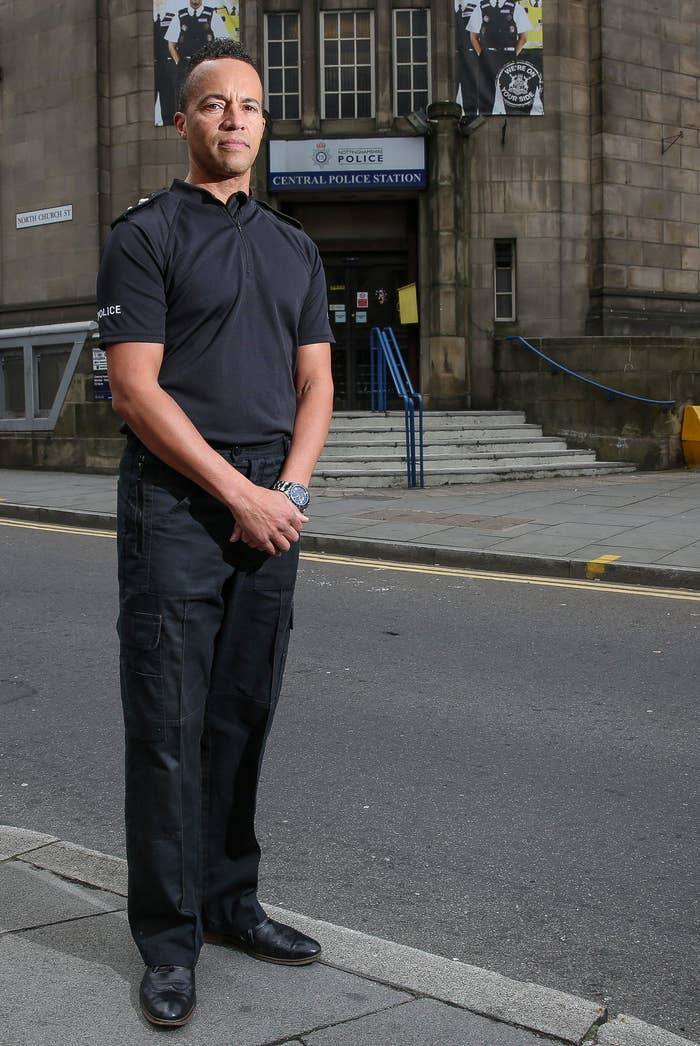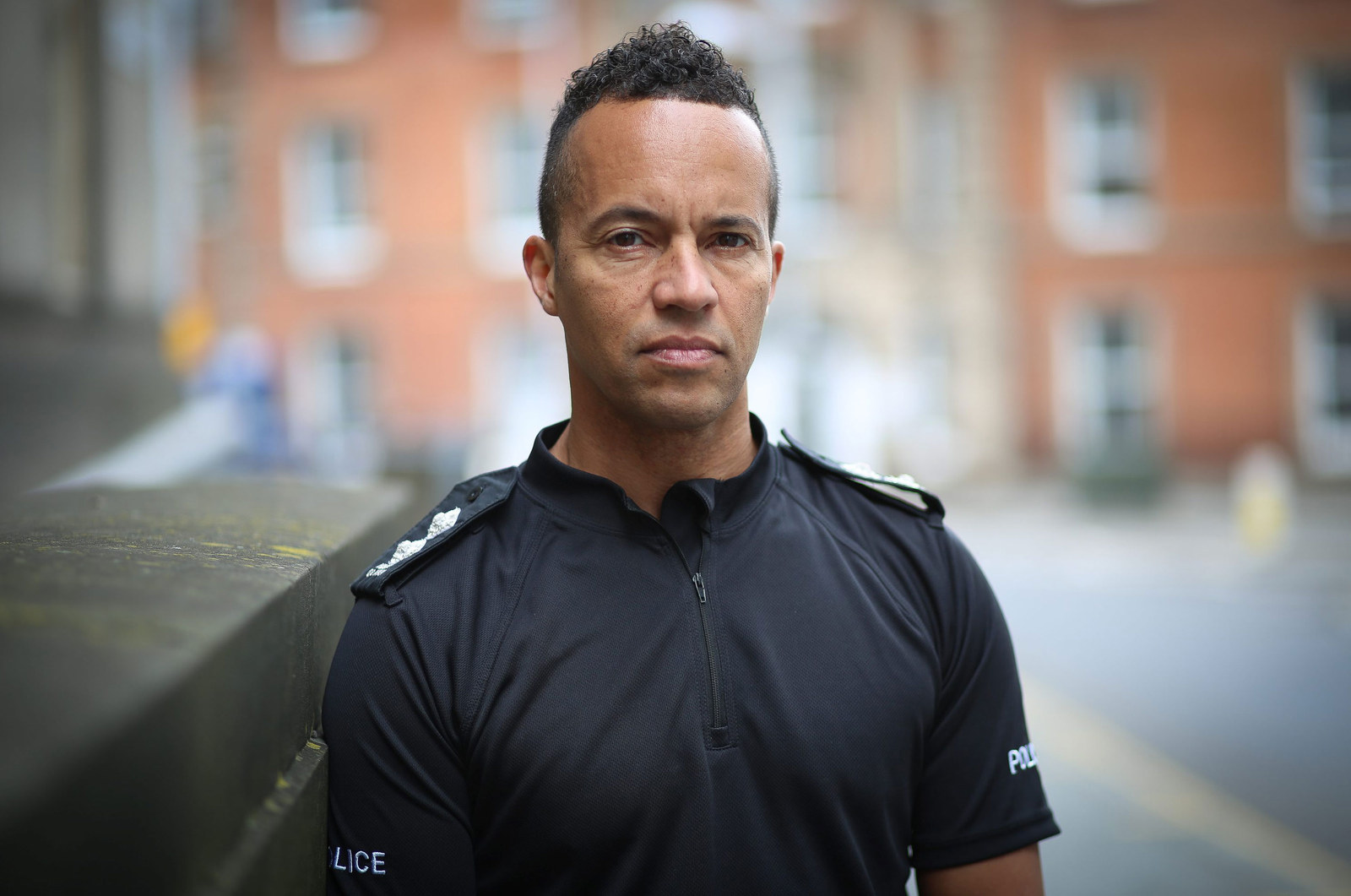
Last year, while trying to get into a bar in Nottingham with his friends, Nick Glynn was pulled aside by bouncers. “The door staff grabbed hold of my arm and said, ‘The police wanna talk to you,’” he recalls. “Then two sergeants took me to the other side of the road and stopped and searched me in front of the crowd of people queuing.”
For Glynn, it wasn’t anything unusual. He estimates he’s been stopped and searched more than 30 times. “It might be even more,” he admits. “I’ve lost count, to be fair.”
In this case, he was detained for 10 minutes or so. “I’d shown them ID to prove I was over 21,” says the 47-year-old. “But they thought it was fake.”
It’s an experience that many people have been through. But in Glynn’s case, there’s a twist. The ID he was trying to show them wasn’t his driving licence, but his police ID. Indeed, Glynn isn’t just a police officer – he’s the head of the stop and search programme at the College of Policing.
Across Britain, police officers hold the power to stop, search, and question anyone if they have “reasonable grounds” to suspect they are carrying a weapon, illegal drugs, stolen property, or something which could be used to commit a crime. You can also be searched without “reasonable grounds” with the approval of a senior police officer, for example if it is suspected that serious violence could take place or you’re in a particular trouble spot.
There are a host of rules about how such searches are meant to be carried out: Officers should tell you their name, their police station, what they expect to find, the reason they want to search you, and the legal rationale, and give you a record of the search. But these rules are often ignored. “In many of these cases, I certainly haven’t been given the right paperwork or had my rights explained to me,” says Glynn.
Take that night in Nottingham. “It was a really bad experience,” he says. “It was in front of loads of people. It’s difficult to stay calm but I did stay calm. While I made it very clear that I was unhappy, I didn’t shout or swear or do anything that would mean that all of a sudden it turned into something horrible.”
In the end, to prove he was a police officer, “I actually gave them the phone number of the patrol room in the force where I work in Leicester. Although, to be fair, if they’d have just googled me, they’d have been able to see, but no, no.”
Even once he was released, the officers didn’t say sorry. “One of the things that many people who have been detained or inconvenienced by use of police powers want is a simple apology for having taken your time. But yeah, there was none of that. So that was pretty poor.”

The reason Glynn has been stopped and searched quite so many times is pretty simple: He’s black. According to the latest Home Office figures, black people are five times as likely to be stopped as whites, and Asians and those of mixed race twice as likely. In some areas, black people are 29 times more likely to be searched.
In a personal capacity, Glynn admits that he’s seen “a very persistent pattern” among his friends. “I’ve got white mates and black mates and if you talk to them, there is a difference in their experience of being stopped by the police."
If you’ve never been on the receiving end, says Glynn, it can be difficult to know how it feels to be viewed as suspicious. “People will often say ‘I’ve been through airport security – I know what being stopped and searched feels like. But it’s not the same thing.”
Being singled out by the authorities, he says, leaves you “embarrassed, frustrated, angry”.
To give just one example, the former Charlton footballer Paul Mortimer estimates he has been on the receiving end of stop and search at least 20 to 25 times. “I had been shopping with my wife and children, and we were going to our car,” he told the authors of a report on stop and search. “And then, all of a sudden, these people around us sprang into action and I was held against the wall. My wife was held. There were cars screeching, loads of police cars, and everything."
According to Mortimer: “The police said I’d looked a little bit ‘shifty’ when I was signing my credit card. A gold credit card had been stolen, and I supposedly looked like I may fit the bill for being that person. This word ‘shifty’, I think for them it meant ‘black guy with a gold credit card’. But I didn’t look shifty. It wasn’t illegal. It was mine. But no questions were asked. I was treated like a criminal, like I was already guilty."
Mortimer was left shocked by the ordeal: “I was absolutely fuming, because I’d done nothing wrong, yet I’d been manhandled, I’d been accused, I’d had my hands put behind my back. I’d been embarrassed because people were walking around. People walk by and look and perceive you to be a certain way. You never forget those types of looks from people. … I felt that I needed a shower after. I felt really inadequate, I felt dirty."
The result of such instances of stop and search powers being used unfairly, says Glynn, is that “people have less faith and confidence in the police as a fair organisation”. This, he says, “has a ripple effect through people’s family, friends, and acquaintances that doesn’t end the day that the power was used. It goes on for months, weeks, and even years”. As a result, he believes, “it has destroyed trust [in the police] for some people, and we shouldn’t underestimate the legacy of that”.
Of course, things have come a long way since Glynn started out on the beat in Leicester, 30 years ago. "I knew I wanted to work with people and I didn’t want to be stuck in an office all day, so I wrote to a load of police forces as soon as I finished my A-levels," he says. “I remember telling them in my final job interview that I wanted to drive a police car with blue lights and sirens on really fast and they just laughed.”
As a black policeman, Glynn was very much in a minority back then. “I only remember one other black officer and one Asian officer, who have long since retired. It was 30 years ago, so of course we were treated differently then.”

When Glynn started out on the beat in 1986, the “sus laws” – short for “suspect” – had recently been abolished. These had enabled police officers to stop and search anyone as long as they suspected they might be planning to carry out a crime. No hard evidence was needed. In their place, the Police and Criminal Evidence Act – the legislation that standardised and safeguarded stop and search – was introduced.
"It didn’t actually come into practice until January of 1986, when I started," says Glynn. "I didn’t use it very much when I was on the frontline. I always thought we should target its usage to the right issues and the right people – not the numerical targets that did exist at certain points."
As the use of stop and search grew, largely in response to the setting of those targets for its use, some ministers and officers did try to rein it in. Theresa May, as home secretary, has taken a firm stance, saying last year that the misuse of stop and search has been an “enormous waste of police time” and “hugely damaging to the relationship between the police and the public”, and promising to bring in a new code of conduct. This resulted in the Best Use of Stop and Search Scheme, introduced last summer: Officers now have to record the outcome of searches in greater detail in order to see if there is a direct link between what the officer was looking for and the final outcome.
But while there has been some improvement – the total use of stop and search fell by 12% last year – stop and search continues to be a postcode lottery, with significant variations between individual forces and individual officers. Her Majesty’s Inspectorate of Constabulary (HMIC) – the body responsible for inspecting the police – ruled that at the beginning of March “too little progress had been made”.
Stephen Otter, who led the research, said: “Too many police leaders and officers still don’t seem to understand the impact that the use of powers to stop and search people can have on the lives of many people, especially young people and those who are from black and minority ethnic backgrounds." He also criticised officers for a “lack of empathy” about the human consequences of stop and search.
The HMIC report found that ethnic minority groups were being disproportionately targeted when driving, and were also less likely to be given a reason for being stopped. Strip searches were identified as a particular problem because there is no legal obligation for officers to record them. As a result, it is difficult to know how regularly they are carried out and whether they are done legitimately or appropriately.
Glynn insists that we need a “wider definition” of stop and search. In his words, “We need a broader focus on all uses of police stop powers per se, such as road traffic stops and strip-searches.”
He argues that the use and misuse of stop and search can “make members of the public who have done nothing wrong feel uneasy standing around, and that’s not a good thing”. When routine, everyday activities such as hanging out with friends in public spaces are seen as suspicious, freedom of movement can be restricted.
“It can be very difficult for people to control their anger if they think they’ve been treated unfairly," Glynn admits, "but you’ve absolutely got to otherwise it turns into a public order offence. Although I’m not saying that it’s easy, because I know people have frustrations." Including an off-duty police officer who knows all too well what it’s like to be on the receiving end.
